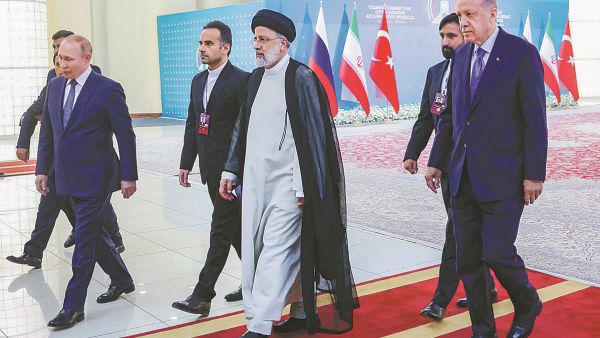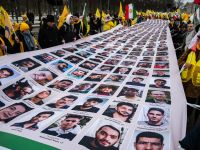Iran and Turkey have a common border of about 534 kilometers and a long history of relations. The relations between the two regional powers have been accompanied by repeated patterns of friendship and competition in the past two decades. In the past few years, despite different priorities of foreign policy and sometimes similar or conflicting interests, relations have continued. In the meantime, it should be said that the relations between the two countries can be defined in two areas: Competition and cooperation.
My latest: While the nexus of competition regarding drone development between #Iran and #Turkey is not new, it has seemingly accelerated in recent months and appears to have spread across Central Asia. Today, 3/5 Central Asian countries have purchased Turkish drones. https://t.co/lmmdu4sjqU
— elisabethgmalo (@elisabethmalom1) August 15, 2022
Areas of competition:
In the last decade, Iran and Turkey's interpretation of economic, geopolitical and identity interests, ideological approaches, space programs, defense capabilities, security interests, opportunities, and threats of competition of both actors have increased. The role of Iran and Turkey in the Islamic world has sometimes led to more competition between them. For example, some of Turkey's goals such as consolidating its position, geopolitical branding, brotherhood thinking, and playing a role as a power in the region, are in competition with Iran's strategic interests.
The peak of challenges and clashes between Iran and Turkey can be seen in Syria. The two actors have different views on Kurdish, water resources, Turkey's historical claims, and the issue of Syria's territorial integrity. For example, while Turkey considers the military attack on northern Syria necessary for its own interests and to remove the threat, Iran is against it. From Ankara's point of view, the expansion of Iran's influence in Syria and Iraq will distance Turkey from the Middle East.
Dealing with terrorism, issues in northern Iraq, Kirkuk, rights of Iraqi Turkmen, and Turkey's historic claim to the north of Iraq, are the axis of rivalry and difference between Iran and Turkey in Iraq.
Iran’s ?? volleyball ? ladies have booked their place in the final of the volleyball competition at the 5th Islamic Solidarity Games following their 3-0 win over Azerbaijan. Iran will wait for the winner between Turkey and Cameron in the match that will be held today. #ISSF pic.twitter.com/qJsYOjQQaW
— Islamic Solidarity Sports Federation (ISSF) (@issfsa) August 14, 2022
Turkey's attempt to carry out military operations and expel Kurdish militias and PKK from northern Iraq and Sinjar is while, Iran highlights the danger of ISIS revival in this region.
Turkey interprets the relationship between Hashd al-Sha'abi and the YBŞ (Sinjar Resistance Units) as Iran-PKK relations and considers it harmful to its national security of Turkey and national security of its allies. In fact, many in Ankara consider Iran's increasing opportunities and influence in Iraqi Kurdistan, the Syrian-Iraq border, Kirkuk and Mosul as a threat to Turkey's national security.
In another dimension, Iran and Turkey are competing to create regional alliances. The competition and even conflict between the two countries in the Caucasus has increased in areas such as the 2020 Karabakh war between Armenia and Azerbaijan, the growth of relations between Azerbaijan and Israel, the Nakhchivan-Azerbaijan corridor project, and the Organization of Turkic States.
In this area, while Ankara joined the "Three Brothers" joint military exercise in Baku, Iran's policies and exercises near the border with Azerbaijan was a sign of the differences between the two countries in this area. In addition, the two countries have special and different views on the war crisis in Yemen.
Also, the scope of presence of Iran and Turkey in Afghanistan is at the level of regional competition. Moreover, it seems that Iran criticizes the closer relations between Turkey and Israel. In the field of water and hydroelectricity, it seems that the interests of Iran and Turkey are inconsistent.
From Turkey's point of view, Turkey's plans and construction of dams are not the cause of water shortage in Iraq, Iran and Syria. But many in Iran evaluate Turkey's approach in the upper Tigris, Euphrates and Aras against Iran's national interests, hitting the environment and causing negative regional consequences. There are still competitions between the two countries in the fields of soft power, culture and economy.
Areas of cooperation
Following Recep Tayyip Erdogan's recent visit to Tehran, Iran and Turkey, in addition to following the Astana process, signed eight cooperation documents and memorandums of understanding, such as the long-term cooperation plan between Iran and Turkey, support for small economic enterprises, and radio and television cooperation.
Iran-Turkey relations & the complicated mix of rivalry, competition & cooperation on different fronts - analyzed by @AlexVatanka @MiddleEastInst https://t.co/pI9qLmz9eU
— Brian Katulis (@Katulis) August 4, 2022
The variable of economy is the most important area of cooperation between the two countries in the current situation. Turkey and Iran plan to increase their trade cooperation to 30 billion dollars despite their differences and competition.
Although the Coronavirue pandemic and sanctions against Iran have reduced the volume of commercial and economic cooperation to about 7 billion dollars, but the relations between Iran and Turkey are complementary in the economic field and can be expanded for various reasons. While Turkey intends to be the center of energy trade in the region, attempting to extend Iran's gas export contract to Turkey after 2026 and increasing the amount of gas exports can increase the scope of bilateral cooperation.
Also, Turkey's emphasis on the necessity of canceling various sanctions against Iran and revitalizing the 2015 Joint Comprehensive Plan of Action Agreement (JCPOA) can increase economic cooperation between the two countries.
In his latest paper, Rasanah’s @RaoufMostafa1 discusses recent international power shifts, shedding light on Iranian-Turkish rivalry.
Now available in PDF:https://t.co/9mL8mHq51l#Iran #Turkey #Russia pic.twitter.com/18NK2h9row
— معهد رصانة- RASANAH INSTITUTE (@rasanahiiis) August 4, 2022
On the other hand, Iran-Turkey relations have been one of the most stable relations in the history of the region. Despite the many ups and downs in the relations between the two countries during the last one hundred years, the level of differences has never reached the level of hostile behavior and conflict.
Now, with the more serious attention of Ankara and Tehran to the roadmap of long-term cooperation between the two countries, cooperation areas such as combating smuggling, illegal immigration and immigrants, interaction in the field of technology, cooperation in the environment, development of sports cooperation, facilitation of banking transactions and investment should be considered more.
For example, while Turkey hosts several million refugees; bilateral cooperation in this field can be beneficial for both countries. On the other hand, crises like Syria can always be a matter of reducing tension and consulting to resolve tension.
As in the recent Astana meeting in Tehran, Iran and Turkey's emphasis on the peaceful resolution of the Syrian crisis, commitment to the sovereignty, independence, unity, and territorial integrity of Syria, the continuation of the destruction of terrorism, and the lack of a military solution to the Syrian conflict is an opportunity for cooperation. In addition, the increase of military and security cooperation between Iran and Turkey in areas such as anti-terrorism and the fight against ISIS, border cooperation, and training and exercise programs is still on the agenda.
Also, Turkey needs Iran for transit and regional alliances and to expand its sphere of influence to the Asia-Pacific region, and Iran also needs Turkey for a more appropriate relationship with Europe. In addition, the Iran-Turkey axis still has various potentials for further cooperation in the form of regional and international institutions and organizations such as the United Nations, UNESCO, the Organization of Islamic Cooperation, Shanghai, etc.
Vision
In the past few centuries, a combination of historical, geographical, cultural, political, and economic factors have played a role in the relations between Iran and Turkey. The "friendship treaty" between Iran and Turkey in 1926 was an important step in the relations between the two countries in the 20th century.
Turkish-Iranian relations have brought periods of cooperation and confrontation. But the pendulum of relations between the two countries swings between cooperation and controlled competition, while the economy has been a key element in the era of competition.
From a special perspective, Tehran and Ankara are forced to cooperate in many areas. Therefore, they should develop win-win relations and prioritize their common interest. The decision of Joe Biden to reduce the US presence in the region may increase the possibility of more competition between Turkey and Iran in the conflict zones. Or Iran can use a new JCPOA to strengthen its presence in the region in better competition with Turkey.
But the change of conditions cannot bring two countries in completely opposite directions. They may have very Divergent views on the "future". However, the experience of dozens of relations between the two countries has shown that competition will remain at the same time as cooperation, but both will try to control differences and conflicts.
Also, various components such as geography, common threats, national interests, commonalities, and historical and cultural ties and political will are also important factors for the continuation of cooperation and competition between the two countries.







